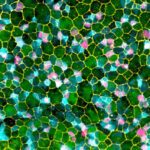Link to Pubmed [PMID] – 12101103
EMBO Rep. 2002 Jul;3(7):688-94
Inhibition of amyloid beta-peptide (Abeta) production by blocking gamma-secretase activity is at present one of the most promising therapeutic strategies to slow progression of Alzheimer’s disease pathology. gamma-secretase inhibitors apparently block Abeta generation via interference with presenilin (PS) function. Besides being an essential component of the gamma-secretase complex, PS itself may be an aspartyl protease with gamma-secretase activity, which is not only required for Abeta production but also for a similar proteolytic process involved in Notch signaling. Here we demonstrate that treatment of zebrafish embryos with a known gamma-secretase inhibitor affects embryonic development in a manner indistinguishable from Notch signaling deficiencies at morphological, molecular and biochemical levels. This indicates severe side-effects of gamma-secretase inhibitors in any Notch-dependent cell fate decision and demonstrates that the zebrafish is an ideal vertebrate system to validate compounds that selectively affect Abeta production, but not Notch signaling, under in vivo conditions.

